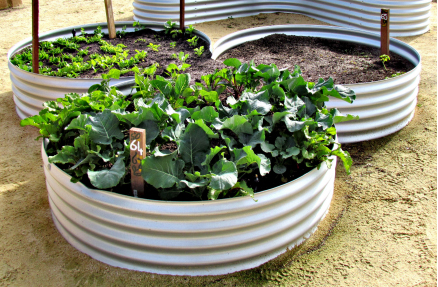
Ohio State’s program allows Vinton County residents to grow fresh food in container gardens and a community garden. Credit: Courtesy of Ohio State
More than 23.5 million Americans live in “food deserts,” which the U.S. Department of Agriculture classifies as areas where people do not have easy access to fresh food. Vinton County, a rural county located in the Appalachian region of Ohio, is one of those places.
While some towns in the county might have dollar stores and gas stations, some residents drive long distances to get to a supermarket.
“Depending on where a resident lives in the county, a trip to the grocery in an adjacent county may add 15 to 40 miles to the round trip,” Vinton County Commissioner Terri Fetherolf said. “There are two groups of residents that are more burdened by the lack of a grocery (options): low-income families and the elderly.”
The situation has led some community and outside groups, including Ohio State, to address the problem.
The OSU project began in February 2014 after the OSU team received a grant and partnered with the Comprehensive Cancer Center. The goal of the project was to introduce fresh produce and healthy food in hopes of lowering the heightened cancer rates in the region, said Kate Homonai, family and consumer science program coordinator for the OSU Vinton County Extension.
“We have two dollar stores and several convenience stores along with gas stations, and they provide junk food basically,” she said, describing a town of 1,700 residents. “We don’t have fresh produce and don’t have fresh meat, so our food is sort of limited.”
Homonai said demographics are keeping larger corporate grocery chains from opening in the region. The county has only 13,000 residents, and most large stores have said a customer base of at least 20,000 is needed to support a large supermarket, Homonai said.
Fetherolf said county commissioners have sought out sources of funding to incentivize establishing a grocery store in the region.
“This includes supporting the Healthy Food Financing funds that were included in the state budget in 2015,” Fetherolf said. “Many of the convenience stores in the community have stepped up by including some meats, dairy and produce in their inventories to the extent their space will allow.”
Since Vinton County is a rural food desert, residents sometimes face a different set of problems from their urban counterparts. Traveling long distances requires access to a car, something not all residents have, Homonai said. The problem is worse in the winter when roads often remain snowy and unplowed for long periods of time.
The university’s project in the county includes both community gardens and healthy-eating classes. Homonai said the project began with a community meeting in which members of the OSU team distributed tools, such as pots and seeds, that could be used in grow a container vegetable garden.
Homonai said other residents chose to join the community garden, which is a plot of land on the OSU extension campus where residents can grow fruits and vegetables. A local horticulture expert assists the community members, and the university holds monthly gardening classes in order to ensure the garden’s success.
“To address the health issue and the cancer component, we had healthy-eating classes,” Homonai said. “So we had a couple of classes on educating people on how to use the fruits and vegetables they were growing as well as cooking in healthier ways — instead of frying, maybe sauteeing.”
She said there were also classes on food budgeting, and because there is a relatively short growing season, there also were classes on canning and preserving foods. Homonai said that overall there has been a good amount of participation, especially with the container gardens, because residents can grow vegetables at their house. The team surveyed some of the garden’s users and found that they had increased the number of people who were gardening for the first time in several years.
“People have been very excited about what they have been able to grow and how well it has grown,” Homonai said.
![]()


